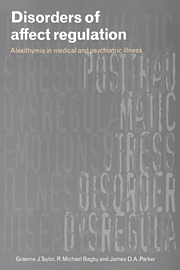Book contents
- Frontmatter
- Contents
- Foreword
- Acknowledgments
- Acknowledgment of permission for use of material
- Introduction
- 1 The development and regulation of affects
- 2 Affect dysregulation and alexithymia
- 3 Measurement and validation of the alexithymia construct
- 4 Relations between alexithymia, personality, and affects
- 5 The neurobiology of emotion, affect regulation, and alexithymia
- 6 Somatoform disorders
- 7 Anxiety and depressive disorders and a note on personality disorders
- 8 Substance use disorders
- 9 Eating disorders
- 10 Affects and alexithymia in medical illness and disease
- 11 Treatment considerations
- 12 Future directions
- Appendix
- References
- Index
4 - Relations between alexithymia, personality, and affects
Published online by Cambridge University Press: 21 September 2009
- Frontmatter
- Contents
- Foreword
- Acknowledgments
- Acknowledgment of permission for use of material
- Introduction
- 1 The development and regulation of affects
- 2 Affect dysregulation and alexithymia
- 3 Measurement and validation of the alexithymia construct
- 4 Relations between alexithymia, personality, and affects
- 5 The neurobiology of emotion, affect regulation, and alexithymia
- 6 Somatoform disorders
- 7 Anxiety and depressive disorders and a note on personality disorders
- 8 Substance use disorders
- 9 Eating disorders
- 10 Affects and alexithymia in medical illness and disease
- 11 Treatment considerations
- 12 Future directions
- Appendix
- References
- Index
Summary
While the results of measurement-based research and experimental studies have yielded considerable empirical support for the validity of the alexithymia construct, the evaluation of any new hypothetical construct should include an examination of the relationships of the construct with higher-order traits or basic dimensions of personality (Costa & McCrae, 1987a). This may be accomplished by examining the relation of reliable and valid measures of the construct with measures of standard taxonomies of personality dimensions. Such taxonomies also provide frameworks for examining the relation between personality and subjective affective experience (Watson & Clark, 1992).
In this chapter, we first describe some currently employed theoretical models of personality, and then review empirical research that has investigated the relations between the alexithymia construct, dimensions of personality, and affects. Because psychological defense mechanisms are aspects of personality that play an important role in the regulation of affects, we also review theoretical conceptions and some recent empirical research on alexithymia and defense style. As with most personality traits, alexithymia is conceptualized as a dimensional construct throughout the chapter.
Personality structure
A central problem in the field of personality psychology has been determining the basic structure of personality. Allport and Odbert (1936) observed long ago that the English language alone has close to 18000 potential trait terms for possible use in personality research. Important choices obviously have to be made about what constitute the essential or core traits of personality.
- Type
- Chapter
- Information
- Disorders of Affect RegulationAlexithymia in Medical and Psychiatric Illness, pp. 67 - 92Publisher: Cambridge University PressPrint publication year: 1997
- 7
- Cited by



